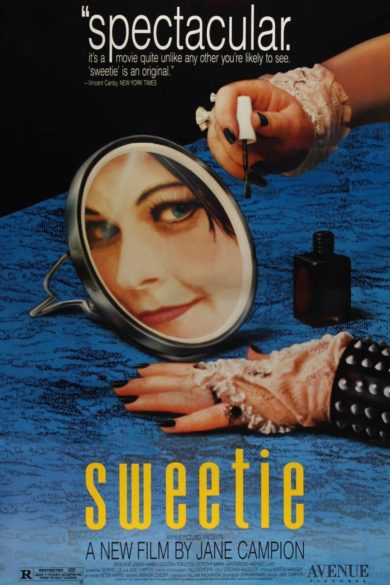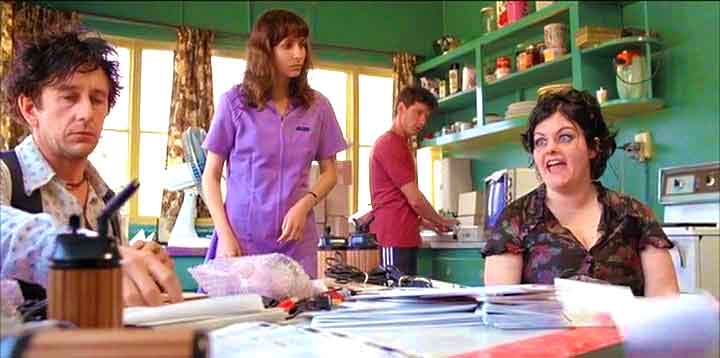 Those who doubt the truth of Jean-Luc Godard’s claim that New Zealand’s Jane Campion “was better when she had no money” need only check out the Australian made SWEETIE (1989), her first theatrical feature. Following a handful of well received shorts and the TV movie 2 FRIENDS (1986), it was dark, mordant and assured in a way that none of her subsequent films have been able to match. Campion was actually proclaimed the “female David Lynch,” but, evidently stung by the film’s less-than-effusive Cannes reception, took a step back from the darkness, following SWEETIE with the far less confrontational (but quite brilliant) AN ANGEL AT MY TABLE and THE PIANO (Godard again: “my Jane Campion, why did you let them drop the piano on you?”).
Those who doubt the truth of Jean-Luc Godard’s claim that New Zealand’s Jane Campion “was better when she had no money” need only check out the Australian made SWEETIE (1989), her first theatrical feature. Following a handful of well received shorts and the TV movie 2 FRIENDS (1986), it was dark, mordant and assured in a way that none of her subsequent films have been able to match. Campion was actually proclaimed the “female David Lynch,” but, evidently stung by the film’s less-than-effusive Cannes reception, took a step back from the darkness, following SWEETIE with the far less confrontational (but quite brilliant) AN ANGEL AT MY TABLE and THE PIANO (Godard again: “my Jane Campion, why did you let them drop the piano on you?”).
Campion was actually proclaimed the “female David Lynch”…
Made, as Godard pointed out, with very little money, SWEETIE is disquieting from the start. We’re introduced to Kay, a severely introverted young nurse who believes she’s destined to be romantically linked with her recently engaged (to one of her co-workers) acquaintance Louis; as she puts it, “He’d worked out that there were seven spiritual planes, and the kind of love we had was somewhere near the top.” This conviction is shattered, or at least called into question, when on their one-year anniversary Louis insists on planting a tree with yellow leaves in the middle of Kay’s back yard. She has a profound distrust of trees, which with their invasive concrete-splitting roots and unpredictable growth remind her of her trouble-making sister Dawn, a.k.a. Sweetie.
…disquieting from the start.
Speaking of whom: at around the 27-minute mark Sweetie abruptly turns up at Dawn’s house. An obese child-woman who’s just been released from a mental institution, Sweetie believes she’s destined to be a famous singer/actor/something, and insists on dragging her “agent” boyfriend Bob with her wherever she goes. Kay finds Sweetie “evil,” and constantly gripes about her unsettled mental state and cluttered lifestyle (a pretty hypocritical stance given Kay’s own incredibly dysfunctional existence).
Shortly after this, the film’s true antagonist, Kay and Sweetie’s father Gordon, turns up. He, we learn, has shamelessly indulged Sweetie’s showbiz ambitions, and cultivated a father-daughter relationship that may be incestuous; it’s for this reason that Gordon‘s longtime wife has left him. Gordon, Kay and Louis embark on a trip to the new home of Gordon’s ex to try and woo her back, leaving Sweetie behind. The gambit fails, and the already on-edge Sweetie grows increasingly unhinged, stuffing her mouth with glass figurines, barking and growling like a dog, and eventually painting her naked body blue and sequestering herself in a tree house—which given her weight is not a safe place to be.
In keeping with the unsettled subject matter, SWEETIE’S form and tone are quite discordant. Oft-kilter and asymmetrical compositions (in which peoples’ faces are placed at the bottom and far edges of the frame) and an aura of strangeness both subtle and overt (few filmmakers have ever done more with errant strands of hair than Campion does here) ensure that the viewer is never allowed to grow too complacent. The disjointed narrative, frequent surreal touches and ultra-thick (and at times downright impenetrable) Australian accents are further obstacles to harmonious viewership.
It’s Campion’s skill and stylistic assurance that hold it all together.
It’s Campion’s skill and stylistic assurance that hold it all together. This is a film whose characters’ wardrobes are as expressive as the actors wearing them, from Kay’s ultra-conservative skirt-and-stockings retinue (which serves as essentially a suit of armor) to Sweetie’s mismatched punk regalia. Also featured are many impossible-to-forget images, such as Kay’s carefully lined up ceramic horse figurines (the ones Sweetie tries to devour) and the film’s signature image of a persistent tree bursting up through crumbling concrete. Pretty these things aren’t, but again, SWEETIE was never meant to be comfortable or reassuring.
Vital Statistics
SWEETIE
Arenafilm/New South Wales Film Corporation
Director: Jane Campion
Producer: John Maynard
Screenplay: Gerard Lee, Jane Campion
Cinematography: Sally Bongers
Editing: Veronika Haussler
Cast: Geneviève Lemon, Karen Colston, Tom Lycos, Jon Darling, Dorothy Barry, Michael Lake, Andre Pataczek, Jean Hadgraft, Paul Livingston, Louise Fox, Ann Merchant, Robyn Frank, Bronwyn Morgan, Sean Fennell, Sean Callinan, Norm Galton, Warren Hensley

